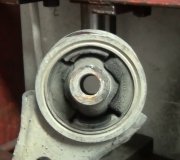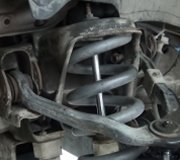You're welcome. To be honest, I'm a fan of the Chrysler company, but they have plenty of models I wouldn't want to own. Since at least the 1940s, they were the world's leader in innovations that benefitted their car owners. GM is the world's worst when it comes to "customer-unfriendly business practices". I don't have a problem with the fit and finish or ride quality. My grump has to do with all the ways they have figured out to suck your wallet dry after the sale. When it comes to those customer-friendly business practices, the consensus among independent instructors for Carquest is the top of the list goes to Hyundai, Toyota, and Chrysler, in that order. That doesn't mean their vehicles are any better or worse, or that you won't have a major breakdown. It means their warranty and repair policies take into account the best interests of their customers even though it can cut into their profits. GM seems to give absolutely no consideration to generating a future repeat sale. Their salespeople will do whatever it takes to sell a vehicle right now. Other business owners realize spending a little now to keep a current customer happy will reward them with customer loyalty in the future. I heard that same comment from my former boss at a very nice family-owned Chrysler dealership. He said it takes fewer dollars to keep ten current customers happy than it takes in advertising to get one new customer. That seems to agree with what I've observed over the years.
By the way, you mentioned you installed a "remanufactured transmission. For a vehicle that's still worth plenty, such as yours, that's the best way to go. Those are basically rebuilt with mostly new parts except for the housing and the internal parts that don't wear. In addition, most of the rebuilder companies incorporate updated parts to address any known problems related to the design, or failures they see over and over. In many ways a remanufactured transmission, or engine, is better than the original. Ford is especially well-known for cutting corners to save a nickel. Build a million cars, and you save a million nickels. That goes way back to the 1970s when some engineer figured out they could leave four grease fittings off the steering linkage. Similarly, they can leave out one clutch plate in the clutch pack for one gear, and the transmission will still hold up, but not for quite as long. A rebuilder will add that extra clutch plate, if it will fit, at a cost of just about nothing to his profits. You won't notice any difference, but this is a perfect example of getting a product that is better than the original.
Among Chrysler's many innovations, they were the first company to have a computer-controlled automatic transmission. The first few dozen were test-driven for thousands of miles, and they were bullet-proof, but everyone in the repair business knows what a disaster they turned out to be once they were no longer hand-assembled and had everything adjusted exactly to specs. "Tolerance build-up" on the assembly line led to many failures at relatively low mileages. That means a sealing surface could be off by a little and still be okay. The sealing ring could also be mispositioned by just a little, and be okay, but when you added all the other measurements that were all off by just a little, pretty soon you had a seal that was no longer riding on the carefully-machined sealing surface. All of this is addressed and corrected when the rebuilder hand-assembles each transmission. Once that was done to those first Chrysler transmissions, they had no more problems than any other manufacturer.
You have to look no further with Toyota to see how aggressively they were trying to reach their customers to replace air bags at no cost. GM has ways figured out to avoid those costs and responsibilities. Other manufacturers will initiate voluntary safety and emissions recalls before a government agency gets involved. This is another example of what I mean by "customer-friendly" business practices.
So to repeat myself, I've known your frustration when a major repair is needed, but ball joints, hoses, belts, and periodic scheduled fluid changes can be expected on any vehicle. If you'd like some entertaining reading, peruse some of the other questions people have posted. Look at the aggravation they've expressed in trying to diagnose an elusive problem. You'll be thankful you aren't the owner of some of those models.
Consider yourself welcome to come back to visit us with your next problem or question. We have all kinds of informative articles here:
https://www.2carpros.com/articles
to get you started. There's also a real long list of videos on YouTube. Over half of them are model and year-specific, but even some for other models can be helpful. Doing a brake job, for example, is shown on dozens of models, but the important points to eliminate or prevent squeals, pulls, and vibrations are the same for all models. Hope I've made you less upset with your vehicle.
Thursday, July 21st, 2022 AT 4:46 PM



